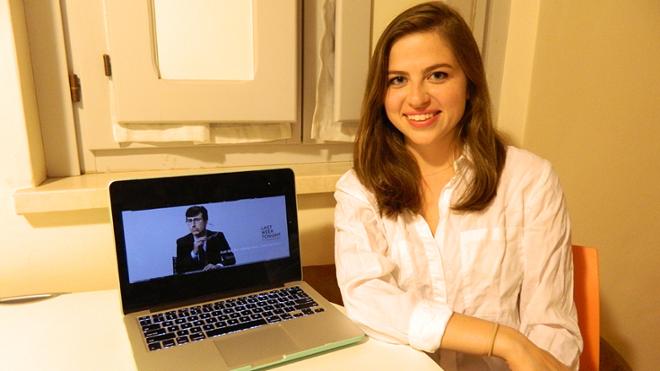Caroline Utz, '17
By Damian Hondares, '17
As a double major in journalism and leadership studies, Caroline Utz, ’17, said she’s always surprised by how often the two fields overlapped.
“We form a lot of our ideas about good or bad leadership through what we see in the news,” she said.
For millennials, that news source is increasingly satirical programming like The Daily Show and Last Week Tonight. Utz was fascinated to see students engaged in the classroom using information they learned from Jon Stewart and Stephen Colbert. This past summer, with the help of a UR Summer Fellowship, Utz was able to explore her interest in satirical news and the overlap between her two majors.
She discovered Kristin Bezio taught courses that used clips from satirical news programs and was familiar with the genre. Utz, who had never worked on a research project before, met once a week with Bezio during the summer to discuss her progress and areas where more substance was needed. “Dr. Bezio offered great guidance but gave me a lot of freedom to explore any aspect that piqued my interest,” she said.
To research the topic, Utz first explored the history of satire and modern journalism to understand the connection between the two. She found that satire had historically focused more on raising awareness of problems than solving them.
Though Stewart and Colbert encouraged audiences to think critically about the news, Utz said, they stuck to an older formula that didn’t push viewers to make a change. “The relief viewers feel when they watch an episode and vent their frustration with society … may ultimately lead followers to inaction,” she said, highlighting the low turnout among young voters, who constituted a large portion of Stewart and Colbert’s audiences.
John Oliver, on the other hand, has introduced a new formula that Utz said is “changing the game” for satirical news. He encourages viewers to act. “When net neutrality was a big issue in the news, Oliver asked viewers to flood the Federal Communications Commission website with comments,” Utz said. “45,000 new comments later, the FCC’s website crashed and officials at the FCC also decided not to allow corporations to charge for faster Internet pathways. This is the new direction of satirical news.”
Utz also said Oliver used social media cleverly, engaging viewers to an unprecedented extent — something Colbert would have to do to expand his reach as a news satirist and newly anointed late-night host.
“In an episode about Miss America and its role as the number one scholarship program for women, Oliver encouraged viewers to donate money to other scholarship organizations like the Society of Women Engineers, which received $25,000 within two days of the episode airing,” Utz said.
She said she had not seen that level of engagement from Colbert’s followers, but that he could still find mainstream success bringing his satirical perspective to the late-night format.
Utz said the experience — and her subsequent 27-page report — brought with it plenty of surprises.
“What surprised me most about the satirical writing process, specifically in satirical news, is the reliance it has on basic elements of journalism,” she said. “I'm still amazed at the way satirists can take such diverse, and sometimes grim, topics and weave humor and absurdity throughout the issues, while still making the audience think thoughtfully about them.”
